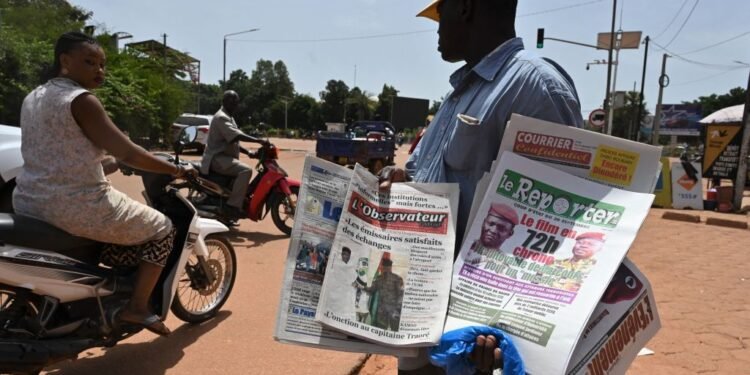ADF STAFF
When reports surfaced in late April that the Burkinabe Army massacred hundreds of civilians, its military-led government sprang into action.
It suspended a host of media outlets, blocked websites, and shut down radio and television broadcasts, while warning international media networks not to report on the story.
Burkina Faso’s chilling treatment of journalists is part of a wider trend in the Sahel, as military juntas have suspended or forced the closure of more than a dozen media outlets over the past three years.
Observers say the region is becoming an “information desert.”
“Restrictions on media freedom and civic space must stop immediately,” the United Nations said in an April 26 statement. “Freedom of expression including the right of access to information is crucial in any society, and even more so in the context of the transition in Burkina Faso.”
International nonprofit Reporters Without Borders (RSF) recently published its 2024 World Press Freedom Index and expressed concern at the rising violence and threats against journalists in military-run Sahel states.
RSF Sub-Saharan Africa’s Camille Montagu called the Sahel a “zone of no free information.”
“Patriotic information has taken precedence over independent, quality journalism,” he said at a news conference in Senegal’s capital, Dakar, on May 3.
Burkina Faso’s ranking in the World Press Freedom Index dropped 28 spots to 86, while neighboring Mali ranked 114 out of 180 countries.
Burkina Faso’s junta has targeted and detained journalists in recent months, forcing some to serve in civilian militia groups on the front lines of the country’s fierce battle against violent extremist groups linked to the Islamic State group and al-Qaida.
Montagu called out the Burkina Faso junta for silencing journalists and other critics. “Summoning, requisition and detention has one objective: to create a climate of fear and encourage self-censorship,” he said.
Another factor in the Sahel is the growing presence of Russia, which has forged partnerships with authoritarians across Africa. Russian mercenaries and military advisors hired to protect junta leaders have brought their country’s notorious style of media suppression, disinformation and propaganda to the Sahel. When the independent media is stifled, disinformation can thrive.
A March report by the Africa Center for Strategic Studies that drew on the work of more than 30 African researchers and organizations identified Russia as the primary sponsor of disinformation on the continent.
“Russia is connected to 80 of the 189 campaigns that we identified and mapped, which is 40% of these disinformation campaigns,” one of the report’s authors, Mark Duerksen, told ADF.
In April, more than 80 political parties and civil groups in Mali issued joint statements calling for presidential elections and an end to military rule.
Mali’s junta responded with more oppression, suspending all political activities and barring the media from covering politics — moves it claimed were necessary “for reasons of public order.”
Duerksen said the junta’s crackdown undermines its own narrative of representing the will of the people.
“How can you say that you’re popular when you’re shutting down opposition political parties, you’re shutting down any kind of reporting on the shutting down of political parties?” he said. “If you say you’re so popular, why do you feel the need to silence dissenting voices, if they’re the minority?”










